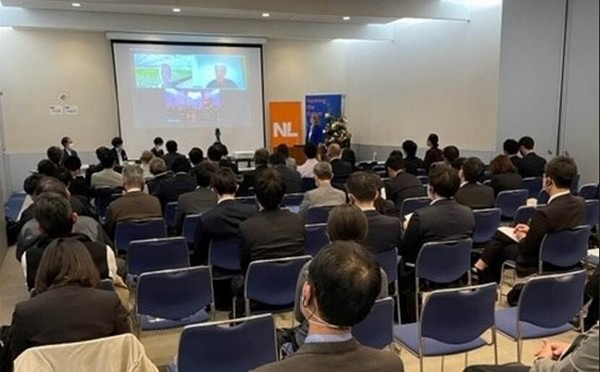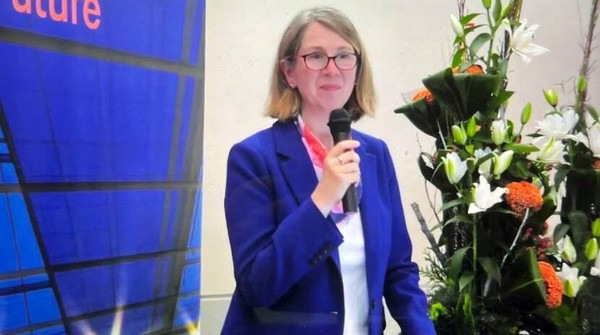On 27 October, the Netherlands Embassy organized its annual Netherlands-Japan Horticulture Seminar on the theme “Sustainable and Profitable Greenhouse Business: High-tech applications to greenhouses.” The seminar was held in a hybrid format, both in person at Tokyo Big Sight and online via Zoom. The event attracted nearly 180 registrants, indicating great interest in this topic.
At the opening of the seminar, H.E. Mr. Peter van der Vliet, Ambassador of the Kingdom of the Netherlands to Japan, gave a welcome address, and Mr. Sumito Yasuoka, Councillor, Minister’s Secretariat (Crop Production Bureau) at the Ministry of Agriculture, Forestry and Fisheries gave a guest of honor speech. This was followed by presentations by experts from both the Netherlands and Japan, which gave the latest information and insight on applications of robotics and data-driven automation in the field of greenhouse horticulture.
The presentations in both English and Japanese are available here.

Venue of the seminar at Tokyo Big Sight. Photo by agroberichtenbuitenland.nl.
 Ms. Denise Lutz, Agricultural Counsellor of the Netherlands Embassy in Japan and moderator of the seminar. Photo by agroberichtenbuitenland.nl.
Ms. Denise Lutz, Agricultural Counsellor of the Netherlands Embassy in Japan and moderator of the seminar. Photo by agroberichtenbuitenland.nl.
A panel discussion followed the presentations, with Ms. Denise Lutz, Agricultural Counsellor as moderator. Since the two Dutch presenters could not join the discussion in real-time, two other experts from the Netherlands, namely Mr. Pieter de Visser, Senior scientist plant modeling of the Business Unit ‘Greenhouse Horticulture’ of Wageningen University & Research and Mr. Wierd Vonk, General Manager Asia at Hoogendoorn Growth Management, joined as panelists. Together with the Japanese presenters, they contributed to lively discussions on questions related to the topics presented.
It was suggested that although there are still gaps to be filled before technologies such as Digital Twin, an integrated AI platform, or robotics are fully applied to commercial greenhouses, each of them is expected to contribute to more sustainable food production with less input, less waste, and better performance. The cost of implementation is critical to success, as are the mindset and skills of growers who are the operators of greenhouses. With regard to costs, it was pointed out that whereas for research purposes, advanced high-tech tools may be preferable, for practical implementation, less sophisticated and less expensive equipment, like inexpensive sensors or simple twin models, would do just fine. As regards the future of growers, all panelists agreed that even when all technologies are fully developed and implemented, growers are still necessary, although their role will be changing: they will become more like data scientists in charge of keeping an overview of the strategies that are followed.
Source: www.agroberichtenbuitenland.nl.
